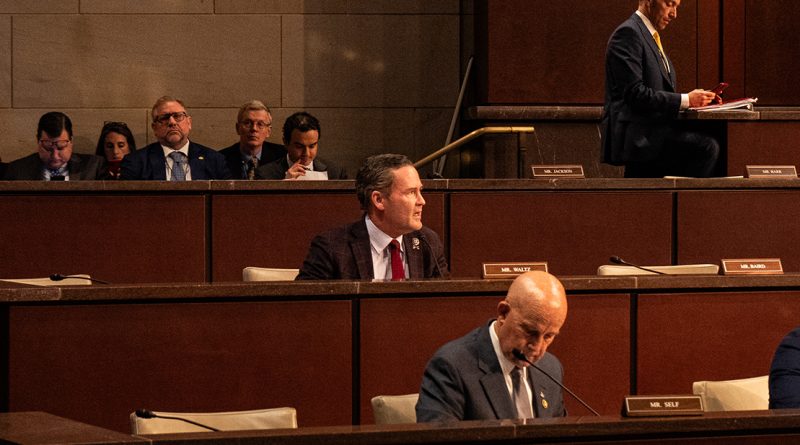House panel OKs bill aimed at streamlining US arms sales
By MATHEW J. SCHUMER
Capital News Service
WASHINGTON — After U.S. arms exports hit a record high in 2023, the House Foreign Affairs Committee voted to advance legislation aimed at speeding up U.S. arms exports.
Critics are concerned that transparency will be the victim of the legislation, which amends the Arms Export Control Act to increase the thresholds for reporting to Congress arms exports to other countries.
Rep. Michael Waltz, R-Florida, introduced the legislation in December. The measure is cosponsored by two Democrats, Reps. Seth Moulton of Massachusetts and Jared Moskowitz of Florida. Moskowitz was the only Democrat in the foreign affairs panel to vote in favor of the bill.
“We should learn from Ukraine and simplify this bureaucracy so that they can do the fighting for their interest with less involvement from the United States,” Waltz said during the hearing.
But Kathy Manning, D-North Carolina, objected to the measure during a foreign affairs committee hearing last week.
“The real impact of the bill is to diminish our constitutional oversight duty and our responsibility as legislators with the prospect of less oversight,” Manning said. “This is not simply an inflation fix.”
Current regulations require that Congress be informed of exports of at least $200 million in military design and construction services, $50 million in defense technology, $14 million in major defense equipment, or $1 million in certain other categories of weapons.
Thresholds are higher for members of NATO as well as for Australia, Israel, Japan, South Korea and New Zealand. For these transactions, the president must notify Congress 15 days in advance of the transfer, whereas most other contracts require a 30-day review period.
Sales in these categories are subject to congressional review.
Waltz’s legislation increases the dollar thresholds by at least 60%. The bill also allows the secretary of state to complete arms sales or transfers that have been delayed by Congress for three years.
Rep. Warren Davidson, R-Ohio, introduced the bill’s only amendment, calling for the secretary of state to report annually to Congress which countries’ major defense purchases exceeded the thresholds in the current arms export law. The amendment was rejected by a vote of 25-21.
“(This bill) comes in the context of a lot of concern over how weak the safeguards are for U.S. security cooperation and for U.S. arms transfers,” said Elias Yousif, a research analyst with the Henry L. Stimson Center’s Conventional Defense Program. The Stimson Center is a nonpartisan think tank in Washington.
“…In the context of those concerns, these reforms seem especially untimely,” Yousif said.
According to the State Department, the United States government last year transferred $80.9 billion in arms to other nations — the highest annual total in history. Commercial arms sales between U.S. manufacturers and other countries authorized by the department during the same period totalled $157.5 billion.
Poland received nearly $42 billion in arms transfers from the U.S. government last year, after the Biden administration signed a $2 billion loan to modernize that country’s military, citing its “central support role in facilitating international assistance to neighboring Ukraine.”
Last December, the State Department waived congressional review twice to fulfill requests from Israel for tank and artillery ammunition worth a combined $254 million.
A group of 19 Democratic lawmakers penned a letter last month to Secretary of State Antony Blinken, asking why the administration waived congressional review for those arms sales to Israel.
“It is essential for Congress to be able to conduct oversight of these arms transfers and determine whether they are consistent with humanitarian principles and U.S. law, and whether they advance or harm U.S. national security,” the lawmakers wrote.
“We appreciate that your administration has repeatedly urged the Israeli government to take additional steps to reduce civilian casualties,” the Democrats added. “However, we are concerned that these transfers and the administration’s evasion of congressional oversight may be inconsistent with broader U.S. foreign policy goals.”
Sen. Bernie Sanders, I-Vermont, one of the lawmakers who signed the Blinken letter, also introduced a resolution demanding a summary of U.S. weapons sold to Israel since the Oct. 7 Hamas attacks, and how those weapons are being used by the Israeli Defense Force (IDF). The Senate voted 72-11 table this resolution.
In a December report, Amnesty International said that the IDF used U.S.-made missiles, known as JDAMs, in two separate bombings on the Gaza Strip last October, claiming the lives of at least 62 civilians. Bloomberg reported a few weeks later that after Oct. 7, Boeing expedited deliveries of about 1,800 JDAM kits under a 2021 sale. Human Rights Watch in 2018 raised similar concerns regarding the use of U.S. weapons in the Saudi-led coalition’s air campaign against the Houthis in Yemen that killed many civilians.
A subsequent review by the State Department Inspector General’s Office of arms transfers to Saudi Arabia and the United Arab Emirates determined that the agency failed to fully assess the measures required to avoid civilian casualties when authorizing the transfers.
“At a time when lawmakers were raising very serious humanitarian concerns about the U.S. defense partnership with Saudi Arabia and the Emirates, many thousands of pieces of equipment worth many billions of dollars were still flowing really without their oversight, without their say,” Yousif said. “And so you can imagine that raising notification thresholds just puts so many more of those transfers below the radar.”

Capital News Service is a student-powered news organization run by the University of Maryland Philip Merrill College of Journalism. With bureaus in Annapolis and Washington run by professional journalists with decades of experience, they deliver news in multiple formats via partner news organizations and a destination Website.

